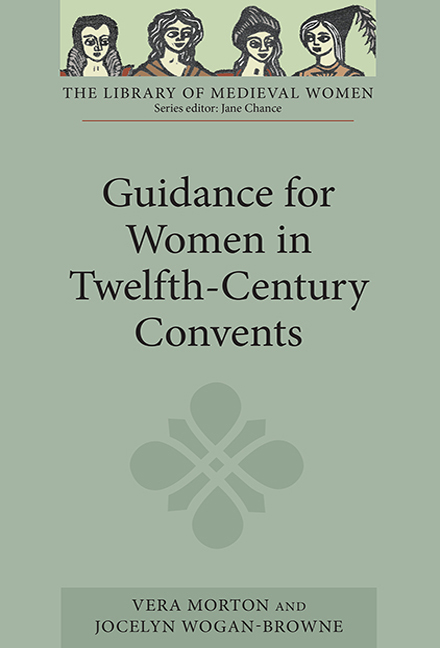Book contents
- Frontmatter
- Contents
- Preface
- Acknowledgements
- Abbreviations
- Introduction
- Note on Texts and Translations
- I Osbert of Clare, Prior of Westminster, to Adelidis, Abbess of Barking: A Thank-You Letter on Holy Widows, Virgin Fecundity and Precedents for Female Authority (Letter 42)
- II Abelard to Heloise: The History of Women's Roles in Christianity (Letter 7)
- III Peter the Venerable to his Nieces Margaret and Pontia: Of Nieces and Grandmothers and the Virgin Life at Marcigny (Letter 185)
- IV Osbert of Clare to his Nieces Margaret and Cecilia in Barking Abbey: Heavenly Rewards for Virgins in Barking (Letters 21 and 22)
- V Abelard to Heloise: On Educating Virgins (Letter 9)
- VI Goscelin of St Bertin: Lives of the Abbesses at Barking (Extracts)
- Interpretive Essay
- Bibliography
- Index
- Index
- Miscellaneous Endmatter
I - Osbert of Clare, Prior of Westminster, to Adelidis, Abbess of Barking: A Thank-You Letter on Holy Widows, Virgin Fecundity and Precedents for Female Authority (Letter 42)
Published online by Cambridge University Press: 29 April 2017
- Frontmatter
- Contents
- Preface
- Acknowledgements
- Abbreviations
- Introduction
- Note on Texts and Translations
- I Osbert of Clare, Prior of Westminster, to Adelidis, Abbess of Barking: A Thank-You Letter on Holy Widows, Virgin Fecundity and Precedents for Female Authority (Letter 42)
- II Abelard to Heloise: The History of Women's Roles in Christianity (Letter 7)
- III Peter the Venerable to his Nieces Margaret and Pontia: Of Nieces and Grandmothers and the Virgin Life at Marcigny (Letter 185)
- IV Osbert of Clare to his Nieces Margaret and Cecilia in Barking Abbey: Heavenly Rewards for Virgins in Barking (Letters 21 and 22)
- V Abelard to Heloise: On Educating Virgins (Letter 9)
- VI Goscelin of St Bertin: Lives of the Abbesses at Barking (Extracts)
- Interpretive Essay
- Bibliography
- Index
- Index
- Miscellaneous Endmatter
Summary
Astranger to medieval letters beginning to read Osbert of Clare's tletter to Adelidis will be struck first by the elaborate courtesy of his thanks to the abbess for her generous hospitality and by his encouragement to her to continue in the way of virtue; a picture of a way of life that is wealthy, formal, and devout begins to form itself. Barking was a prestigious abbey, rich and governed by noble or royal ladies. Its location gave it access to, but some detachment from, London; situated on Barking Creek a few miles down the Thames from London, it was a convenient staging post on the way to France or across the lowlands of Essex and the Fens to the flourishing monastic houses of East Anglia. There must have been many visitors like Osbert at Barking, though not many have left such eloquent traces of their stay. With its formal gratitude and expression of love and respect, Osbert's letter makes us ask what kind of man was this; what was his relationship with the abbess?
It is not easy to disentangle the events of his life, but it appears that Osbert was born some time towards the end of the eleventh century at Clare in Suffolk. The name ‘de Clare’ need not imply that he was of noble family, but his name, Osbert, is probably Norman-French and we may surmise that he belonged to the minor gentry. He was a monk at Clare and (after that monastery was moved) at Stoke. It is difficult to be sure of the order of events in the next few years, but it seems that having been prior at Westminster Abbey for some years, Osbert was passed over for the abbacy in 1121. He then spent time away at Ely, and later at Bury and other monasteries: it is probable that his letter to Adelidis was written during some journey between Ely and Westminster. He returned to Westminster c. 1134 and was elected, or re-elected, prior, but subsequently failed again to gain the succession to the abbacy. In about 1139 on the orders of the new abbot, Gervase (the King's natural son), Osbert went to Rome to petition for the canonisation of Edward the Confessor, taking with him his own biography of the saint.
- Type
- Chapter
- Information
- Guidance for Women in Twelfth-Century Convents , pp. 15 - 49Publisher: Boydell & BrewerPrint publication year: 2003



